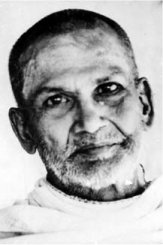
29 The greatness of Aham-mukha (Self-Attention)
Guru Vachaka Kovai (The Garland of the Guru’s Sayings)
184 While Self, the Source and Reality of the ego – which can only know objects other than itself through its senses – alone should be clung to, all an aspirant’s efforts to concentrate on other objects [which are all second and third persons], are just like ignoring something while trying to grasp its shadow.
Michael James: There are two possible translations of the next verse:
185a For the extroverted intellect – which suffers greatly, knowing through the senses only the objects of form and quality before it – the means to abide in Self is to begin enquiring inwardly, “Who am I?”
185b For the extroverted intellect, the means to abide in Self is to begin enquiring inwardly “Who am I, who suffer greatly, knowing through the senses only the objects of form and quality before me?”
186 O miserable and extroverted people, failing to see the seer, you see only the seen! To dissolve duality by turning inwards instead of outwards is alone Blissful.
Sadhu Om: The terms “inward” and “outward” can be used only in reference to the body, but as the body is itself a mere imagination, such terms should not be taken literally. The reason for the use of these words is that the aspirant, in his ignorance, feels his body to be ‘I’, so on being told to “turn inwards” he should understand that the should “turn Selfwards,” that is he should turn his attention towards what he feels as “I”. In truth, Self is neither inside nor outside the body as it alone exists beyond all limitations such as time and space.
187 O mind, it is not wise for you to come out [in the form of thoughts]; it is best to go within. Hide yourself deep within the Heart and escape from the tricks of Maya, who tries to upset you by drawing you outwards.
Sadhu Om: The beginning of the verse may also be translated as, ‘ O mind, it is not wise for you to expose yourself to name and fame…’
188 [O mind,] do not waste your life in roaming outside, pursuing wonders and courting enjoyments; to know Self through Grace [Self-enquiry], and to thus abide firmly in the Heart, is alone worthwhile.
189 Since it is only the notion of duality that spoils Bliss and causes misery, to avoid yielding to the attractions of that notion and to thus arrest all chitta vrittis is alone worthwhile.
190 O people, not knowing that Shiva is dwelling within you, you fly about like birds from one holy place to another [seeking His Darshan]. Consciousness, when abiding still in the Heart, is the Supreme Shiva.
Sadhu Om: To seek Shiva Darshan outside of oneself requires movement, but it is revealed here that to be still is the only true means of seeking it.
191 The ship would be destroyed by the storm if its sails were spread outside, but it is safe when its anchor is sunk deep into the sea. Similarly, if the mind were sunk deep in the Heart instead of being spread outside, that would be Jnana.
192 To arrest the mind – which tries to rush outwards – securely within, is the truly heroic act of the ripe aspirant who wants to see the Supreme Lord in the Heart.
Sadhu Om: The end of this verse may also be translated as, ‘to see the Supreme, who is Lord of the Saints.’
193 When the mind [i.e., the ego’s attention] which wanders outside, knowing only other objects [2nd and 3rd persons] – begins to attend to its own nature, all other objects will disappear, and then, by experiencing it’s own true nature [i.e. Self], the pseudo-‘I’ will also die.
Sadhu Om: This verse clearly teaches that if the mind [i.e. the first person, ‘I’] tries to attend to itself, not only will the 2nd and 3rd persons disappear, but the mind itself will also die. We are thus given here a complete description of the enquiry ‘Who am I?’ that is, we are told the method, what happens during the practice, and what result it will have.
No comments:
Post a Comment